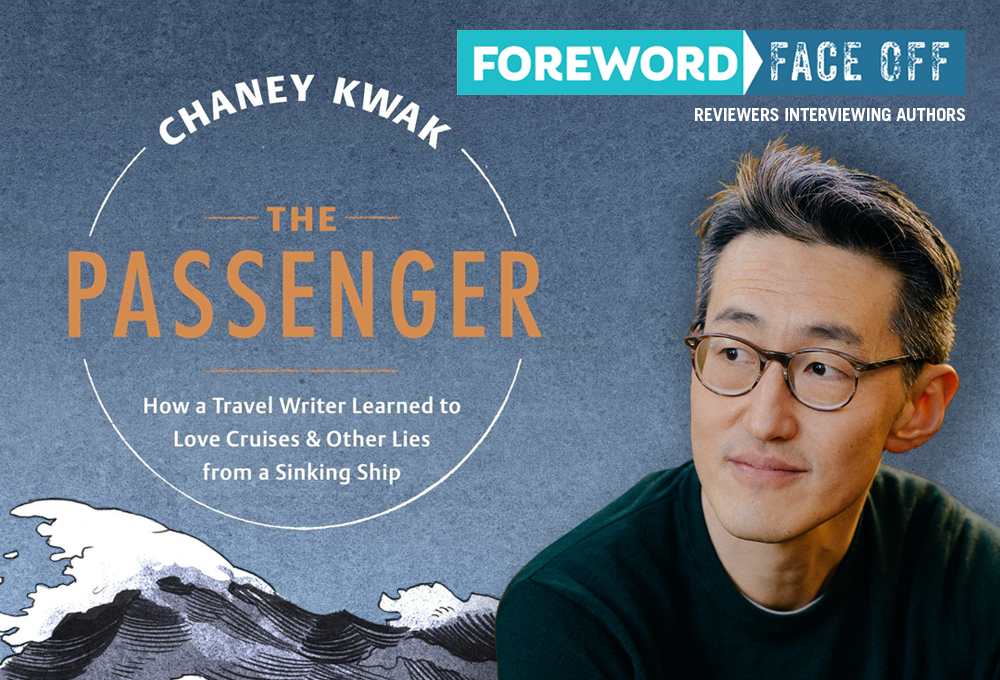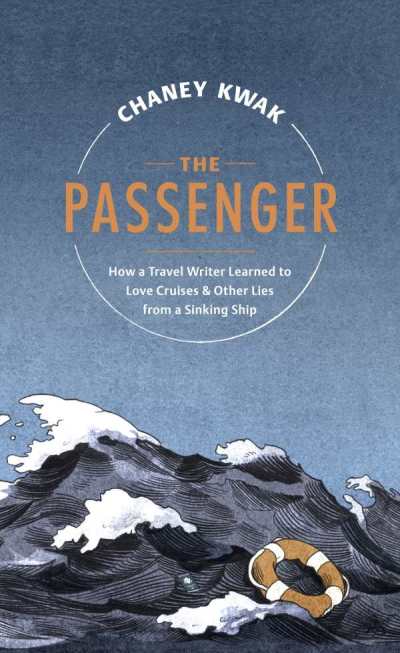Reviewer Kristine Morris Interviews Chaney Kwak, Author of The Passenger: How a Travel Writer Learned to Love Cruises and Other Lies from a Sinking Ship

This week, we’re thrilled to share a conversation between two veteran magazine writers and avid travelers: Foreword reviewer Kristine Morris and Chaney Kwak, author of The Passenger, recounting a harrowing cruise in sixty foot waves he survived off the coast of Norway. In her 
starred review for the May/June issue, Kristine writes: “With screams piercing his cabin walls, and water glasses flinging themselves against the door as if possessed, Kwak confronted not only his own mortality, but his family history, his failing relationship, and the meaning of his life and work,”—confirming that the book is far more than the tale of a bumpy boat ride.
Thanks to the ace staff at David Godine for help in connecting reviewer and author.
The Passenger brought up so much for me, not just about freelance writing, travel, and cruises in specific, but about what happens to a human being who has been broken open by a life-threatening experience, and whose life changes as a result. The events of March 23, 2019, led to your spending twenty-seven hours in a disabled ship on a raging sea, not knowing if you would live or die. How did this change you?
The Viking Sky incident forced me to face the life choices I’d tried so hard to avoid making. I’m very indecisive, and that leads to procrastination. But once you realize that the lifeline may not drop from the sky, you have to decide if you’re willing to risk everything and jump ship—or go down with it, figuratively and literally speaking.
I’m curious about the sub-title of the book, the part about the “…Other Lies from a Sinking Ship.” It seems that more than the Viking Sky is being referenced, and I wonder, in what ways did you feel like a “sinking ship” at the time you wrote the book? What “lies” had you been telling yourself, and perhaps, others?
Thank you for noticing it. The “sinking ship” doesn’t really refer to the cruise, but to my relationship—and even to my life in general, which had become directionless. There were many layers of lies—the ones my ex was telling to hide his cheating, the lies I was repeating to my loved ones to cover for him, and most of all, the ones I was telling myself, including that everything was just fine, and that I could keep living with it all.
During the storm, a “bomb cyclone” with sixty-foot waves and eighty-seven-miles-per-hour wind, after feeling like you wanted to puke your guts out and your body switched into “automatic mode,” you seemed so calm, so observant of the small kindnesses that passengers performed for each other. Did this change, or confirm, your view of human beings in general?
Long before this interview, you wrote a very generous review of The Passenger for Foreword, in which you highlighted my “cynical humor.” After reading it, I called my editor at Godine, Josh Bodwell, and asked, “Do you think I’m cynical?”
He laughed and laughed, then he stopped. “Oh, you’re seriously asking,” he said, and murmured some very diplomatic words about how I may perhaps come across as, well, very cynical.
But I think my humorous cynicism is a protective shell. Deep down, I don’t think people are inherently selfish and only motivated by self-interest. And I can be trusting, even to the point of stupidity—just read the sections of The Passenger about my relationship. I think it’s more like this: I’ve always hoped that humans were good by nature, and secretly bet my everything on it. Sometimes it doesn’t pay off, but I can always keep hoping. So no, my view of humanity wasn’t changed by what I saw in other passengers during the ordeal because I think that, deep down, I’d always believed that we can be kind and courageous in the face of adversity.
Although it’s set mainly on the cruise ship, Viking Sky, your book reveals that you’re not a fan of cruises. Why did you accept the assignment to write an article that required a cruise, especially as the North Atlantic is known for treacherous storms?
As a fellow freelance writer, you probably understand the anxiety—and the resulting tendency to say yes to every assignment. Then again, there’s a reason why I was constantly volunteering to be on the road, even when I was exhausted. During the incident, I had to admit that I was running away from an unhappy home life.
So, let’s talk about your work. How did you get started with freelance writing?
I fell into magazine and newspaper writing while getting my master’s degree in education. The German government gave me a stipend to attend graduate school in Berlin, a city I’d always found exciting. By living there and speaking the language, I had the vantage point of an outsider inside a place I loved. In many ways it was unrequited love, so you can say I was journaling a lot of letters to my crush, that beautiful and dysfunctional city.
I got responses from the American editors I was randomly emailing about what I saw around me. Then, an inflight magazine published a story I wrote about German bakeries, and that’s how I got to write as a side gig while teaching. After five years, I had enough assignments to write full-time.
At the time you wrote The Passenger, you mentioned that you had become dissatisfied and disillusioned with freelancing. Why?
Writing is a financially unsustainable profession for most people. I couldn’t have done it full-time if my ex hadn’t worked for a progressive company that offered health insurance to employees’ unmarried partners. In my book, I compare both myself and a freelance photographer who was also on the ship to dinosaurs trying to evolve into birds as print media enters a new Ice Age. He and I are both reluctantly on social media, watching the influencers soar while fretting about the extinction of the old guards like us.
So, I gather you’re not a fan of social media.
Does social media simply hold up a mirror to the best and worst of how humans have always been? Or does it exacerbate our base instinct to perform a virtuous front and pander to cheap “likes?” I shouldn’t be a hypocrite: As conflicted as I feel, I’m back on Instagram and Facebook to promote The Passenger. I keep reminding myself not to take it seriously, do only what amuses me, and remember that these platforms are designed to be addictive. But it’s all very depressing, to be honest.
As the ship was floundering and in danger of colliding with the rugged coastline, tweets were coming in with “thoughts and prayers,” a phrase you called “‘Americanese’ for resignation and inaction.” Why?
Yeah, maybe I’ll have to walk back a little on what I said about cynicism. In our era of social media-inflamed narcissism, it’s very hard not to feel a little turned off and pessimistic about humans. It seems like we keep one-upping tragedies of greater magnitude each month.
You mention your struggle with depression in the book. How does depression affect your ability to write consistently, or at all? Do you find that writing throws you into confrontations with some of the things that provoke depression?
It doesn’t help me write when the usual hum of depression, which is always with me, gets turned up to a deafening decibel. But can I blame my poor discipline on depression? (Because, for someone who’s been at it long enough, I have pretty poor output to show for the time I’ve spent trying to write.)
Some writers and artists believe that the descent into depression makes them more creative, more sensitive to the reality of suffering. To what degree do you share this belief, and how do you express it in your work? If you do not share it, then how do you keep depression from affecting what goes on the page?
True, creative people appear to be more prone to mental disorders. Then again, maybe it’s because we’re better at articulating maladies common and uncommon. I don’t know what it’s like to be an adult living without depression, so I can’t tell you whether I am the way I am because of, despite, or thanks to depression. And I don’t know if I’d be a happier person if I didn’t write. But I’d like to think I present pretty well on the surface—like a well-adjusted member of society. Maybe that’s also one of the lies from the sinking ship—one that I may have to keep telling over and over in order to live.
Is travel, and writing about it, a coping mechanism? If so, has it been effective for you?
Travel is certainly the best topical medicine I’ve found. Writing about travel helps me process the incongruous beauty of the world, and I’m so privileged to be able to do that. Even if only for split seconds, I feel like I can make sense of my surroundings. But no, it doesn’t permanently lift the fog. I just seem to see better when I’m on the road. I’m still searching for a cure that actually works to correct my vision.
Since travel was your bread and butter before the pandemic, do you have any concern over the reaction of the cruise industry to your book?
Concerns? No. I stand by my reporting. Besides, the real meat of The Passenger is the personal aspect. It’s really scary to make myself so bare and vulnerable, so what the cruise executives might think is probably the least of my worries. I am curious about how the crew members might react. And as I mention toward the end of The Passenger, it was such an overwhelming feeling to know that everyone on that ship walked away with a different tale to tell.
Arriving back in the US, what changes did you make in your life? What did you let go, and what has remained?
I’m afraid this might be a spoiler. Does the incident really change the way I lead my life? Do the events and the day’s confinement aboard the ship help prepare me for the coming worldwide lockdown? Sorry if I’m being coy, but I think this is where my publisher would interject and say, “They’ll have to read the book.”
What brings you joy these days?
Like many others, I became a “plant dad,” and my studio apartment has turned into a greenhouse. The pandemic—which is a real-life equivalent of a shipwreck—taught me that perhaps I’ve been living the life I wanted all along: alone, in the company of others.
Can we hope for another book? If so, what is its subject, and when do you expect it to be released?
That’s very kind of you. My editor, Josh, told me that I should always answer that question with, “I’ve got a languishing Great American Novel in my drawer that’s begging for my attention.” But he’s joking, because he knows I’d never actually say that. In the twenty years I’ve been trying to write, I’ve seen so many of my projects wither to nothing. I’m cautiously optimistic about the novella I’m working on, which deals with backyard beekeeping, the Korean diaspora, and the internment of Japanese-Americans in California. I do hope there are more books in me. I’ll keep trying.
Kristine Morris
